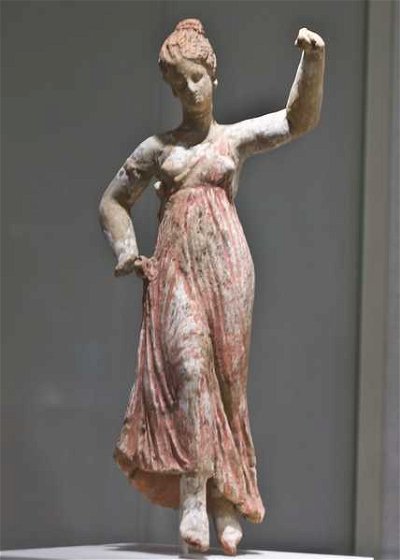23. Theseus won renown for slaying the Minotaur, but he only provided the brawn. Who provided the wit and cunning -- and according to some versions of the myth, the concealed weapon -- that were the monster's undoing?
From Quiz Women in Greek Mythology I: the Strong
Answer:
Ariadne
The story of the Minotaur begins with the impiety of Cretan King Minos, who swore to sacrifice a certain miraculous bull to Poseidon. When Minos substituted another bull to send to the knife, the gods were offended. They therefore caused Minos' wife to conceive an unholy passion for the bull. The Queen ordered Daedelus, the engineer of unparalleled skill, to construct a device to make it possible for her to consummate her desire, so he made a hollow cow with which the bull could couple with the queen inside. She subsequently bore Asterius, the Minotaur, a creature with the body of a man but the head of a bull -- and an appetite for human flesh. An oracle told Minos to 'conceal his shame with cunning' so he ordered Daedelus to build a bewildering maze within which to house the creature. (Because Daedelus and his son knew the way through the maze, Minos then betrayed them by imprisoning them in a tall tower. Daedelus fashioned wings with which the two escaped, but his son Icarus famously flew too high... Daedelus went on to invent hot and cold running water, and to 'thread the conch' among other escapades) ...To make a long story short, Theseus, along with thirteen other youths, was sent by Aegeus of Athens as tribute to Knossos, where Minos would feed them to the Minotaur. Ariadne decided to help handsome Theseus, and therefore gave him a ball of thread (and in some versions of the myth, a knife) with which to mark his trail through the so-called Labyrinth (from a word for axe, presumably because the Minotaur bore an axe, or because the maze contained a sacred axe, or because the palace at Knossos contained a famous axe or axes) so that he might find his way out of it. ...Theseus was successful, and fled Knossos with Ariadne, but faithlessly abandoned her on Naxos. However, Ariadne was comforted there by the god Dionysos, which you have to figure was trading up. ...One last factoid: Theseus screwed up again, by forgetting to hoist the red (or white) sail that would signify to his adoptive father Aegeus that his mission had been successful. Seeing Theseus' ship on the horizon with its original black sail, Augeus leapt into the sea and ended his own life. Hence the name of the Aegean Sea.
 In ancient Greece and Rome ladies were seen dancing at night to loud music, while playing cymbals, flutes, and tambourines. Come and dance with the maenads of mythology!
In ancient Greece and Rome ladies were seen dancing at night to loud music, while playing cymbals, flutes, and tambourines. Come and dance with the maenads of mythology!  Quick Question
Quick Question = Top 5% Rated Quiz,
= Top 5% Rated Quiz,
 Top 10% Rated Quiz,
Top 10% Rated Quiz,
 Top 20% Rated Quiz,
Top 20% Rated Quiz,
 A Well Rated Quiz
A Well Rated Quiz